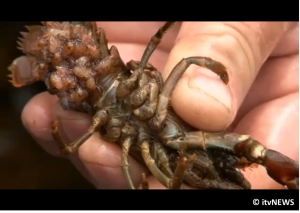Invasive crayfish found in the River Eden

At the beginning of this year, the presence of a population of North American signal crayfish was confirmed in a tributary of the River Eden. This population poses a potential threat to the endangered native white clawed crayfish, as it is a resistant carrier of the fungal disease called crayfish plague. The presence of the signal crayfish may result in the non-resistant native species being wiped out, as they die within a few weeks of being infected. See itvNEWS player for a video report by Kim Inglis.
In the summer last year, the Eden Rivers Trust sent out an alert regarding a suspected sighting of signal crayfish in a tributary of the River Eden. Since the Eden is of international importance for the white clawed crayfish, being one of two British strongholds for this native species, it is of the utmost importance to implement effective measures to prevent disease transmission. The crayfish plague produces free-swimming zoospores specific to crayfish, which can be carried in mud and on damp equipment, as well as in water. The spores can survive up to two weeks in water, but remain viable only when damp.
As part of standard procedure, all visitors and fieldworkers associated with the EdenDTC are required to remove mud from equipment, clothing and footwear prior to disinfecting and drying after site visits, to ensure minimal risk of transmitting spores between catchments. Both the Eamont, of which Thackthwaite Beck is a tributary, and the Lyvennet, of which Newby Beck is a tributary, have well established populations of native white clawed crayfish, thus strict bio-security measures are vital to prevent endangering these native populations.